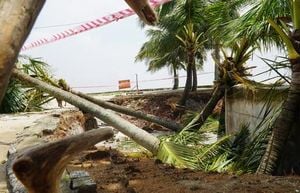In the tense aftermath of June’s bloody conflict between Iran and Israel, senior Iranian officials are warning that the region is not enjoying a true peace, but instead teeters on the edge of renewed warfare. Despite a lull in open hostilities since late June, both Iranian and Western leaders describe the situation as a precarious pause, with no formal ceasefire in place—and the threat of another devastating clash looming large.
On August 18, 2025, Islamic Revolutionary Guard Corps Maj. Gen. Yahya Rahim Safavi, a top military adviser to Iran’s Supreme Leader Ali Khamenei, made headlines across the globe with a blunt assessment of the ongoing crisis. “We are not in a ceasefire; we are in a stage of war. No protocol, regulation, or agreement has been written between us and the US or Israel,” Safavi declared, according to The Media Line and Iran International. His words echoed in newsrooms and diplomatic circles alike, a stark reminder that the guns may be silent, but the war is far from over.
Safavi’s warning was unequivocal. “I think another war may happen, and after that, there may be no more wars,” he said, painting a grim picture of what might follow any renewed violence. He argued that, in the absence of a binding agreement, Iran must remain vigilant and continue to build its power both regionally and globally. “The Americans and the Zionists say they create peace through power; therefore, Iran must also become strong, because in the system of nature, the weak are trampled,” Safavi insisted. This philosophy, he explained, drives Iran’s commitment to strengthening its diplomatic, media, missile, drone, and cyber offensive strategies. “We, the military, do scenario-planning, we see the worst case, and we prepare a plan for it.”
These comments come just two months after Israel launched a surprise military campaign on June 13, 2025, targeting Iranian military and nuclear sites, personnel, and scientists. According to reports from The Media Line and Nova News, Iran responded with missile strikes that killed over 30 Israeli civilians. The 12-day conflict left deep scars: the Islamic Republic reports that 1,062 Iranians were killed by Israel, including 786 military personnel and 276 civilians. The toll included prominent commanders and nuclear scientists, underscoring the high stakes and human cost of this ongoing rivalry.
First Vice President Mohammad Reza Aref reinforced the message of uncertainty and vigilance. Speaking to local media, as cited by Agence France-Presse and other outlets, Aref stated, “We must remain vigilant for potential conflict at any moment; we are not in a formal ceasefire but rather in a temporary suspension of hostilities.” He described the current period as merely a break in fighting—not a guarantee of peace. “A cessation of attacks is not a guarantee—it could collapse at any time,” he warned. Iranian officials, while insisting they do not seek further war, emphasize that the country is fully prepared for another potential clash.
The June conflict was a brutal reminder of how quickly tensions can escalate. Israel’s airstrikes targeted not only military bases but also nuclear facilities and civilian areas, resulting in widespread devastation. Iran’s response, involving both missile and drone attacks, inflicted dozens of casualties in Israel. The United States intervened on June 24, announcing a pause in hostilities two days after conducting strikes on Iranian nuclear sites. However, as multiple sources confirm, no formal ceasefire agreement was ever established—only an informal halt in the fighting.
Behind the military maneuvers, a larger diplomatic crisis is brewing. Western powers continue to accuse Iran of pursuing nuclear weapons through its atomic program—a charge Tehran vehemently denies. The United Nations nuclear watchdog has sounded the alarm, noting that Iran is the only non-nuclear-armed country enriching uranium to 60 percent, far above the 3.67 percent cap set by the landmark 2015 international accord. This level of enrichment is a short step from the 90 percent required for a nuclear weapon, raising fears that the window for diplomacy may be closing fast.
In response to Iran’s nuclear activities, Britain, France, and Germany—all signatories to the 2015 nuclear deal—have threatened to reimpose sanctions that were previously lifted under the agreement. Iran, for its part, has warned of “serious consequences” if new sanctions are enacted, with some officials hinting at a possible withdrawal from the nuclear non-proliferation treaty. Such a move would have far-reaching implications, not just for the region but for global security as a whole.
The crisis is further complicated by the fragile situation in Lebanon, where the United States is urging Israel to honor commitments under a separate ceasefire with Hezbollah. As reported by Agence France-Presse, US envoy Tom Barrack recently called on Israel to withdraw its troops from strategic border points in Lebanon, in line with a November truce that ended more than a year of hostilities. The Lebanese government, under pressure from Washington, has begun the unprecedented process of developing a plan to disarm Hezbollah by year’s end. However, the group’s leader, Naim Qassem, has vowed to resist any such move, stating, “the resistance will not surrender its weapons while… occupation persists.”
Lebanese officials, meanwhile, are pleading for broader international support to stabilize the country and avoid further escalation. President Joseph Aoun emphasized the need for “more support for the Lebanese army” and expedited reconstruction efforts, while Prime Minister Nawaf Salam called on the United States to “fulfil its responsibility in pressuring Israel to halt hostilities, withdraw troops, and release Lebanese prisoners it holds.”
As diplomatic efforts continue, the specter of renewed conflict hangs over the region. Iranian leaders remain adamant that, while they do not seek war, they are prepared for the worst. “We are not under a ceasefire; we are in a state of war that could escalate at any moment. There is no formal agreement, no protocols, no understanding with Israel or the United States,” Safavi reiterated to the Shargh daily. For ordinary citizens in Iran, Israel, and Lebanon, the uncertainty is palpable—and the hope for lasting peace remains elusive.
The coming weeks will be critical as international negotiators, regional leaders, and military planners grapple with the delicate balance between deterrence and diplomacy. Whether the fragile pause in violence can hold—or whether the region will once again be plunged into chaos—remains to be seen. For now, the message from Tehran is clear: the war is not over, and the world should be prepared for whatever comes next.



